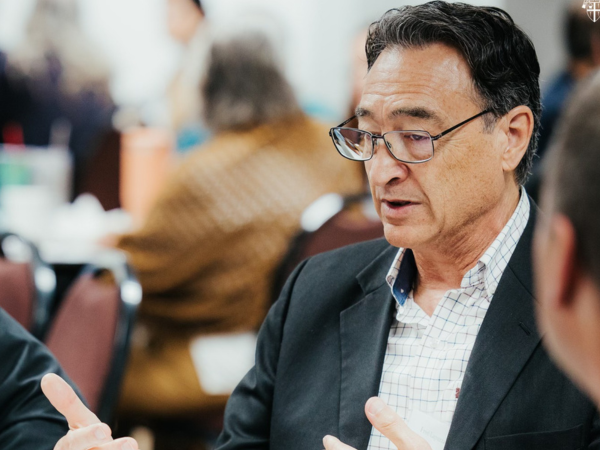IN EVERY ELECTION YEAR, public safety is always high on the list of voter concerns. The rancorous debate centers on how to prevent it and deal with the consequences of criminality for the criminal, the victim and society.

FRED LAPUZZA, DIRECTOR OF THE RESTORATIVE JUSTICE MINISTRY IN THE DIOCESE OF ORANGE, MODERATED A PANEL ON HOPE AND SUCCESS DURING A RECENT CONFERENCE IN SAN DIEGO. PHOTOS COURTESY OF THE DIOCESE OF SAN DIEGO
The California Catholic Conference (CCC) has a long track record of success in ministering to victims and offenders. The CCC states, “Through Jesus, God reaches out to the broken, the poor, the sick and the imprisoned. We seek a Restorative Justice model to empower the Church to heal our communities damaged by crime and violence. This includes the reconciliation and healing of victims of crime and their families, prisoners and their families, and all those who serve in the criminal justice system.” (https://cacatholic.org/)
In his book, “More God, Less Crime: Why Faith Matters and How It Could Matter More,” Baylor University social science professor Byron R. Johnson, Ph.D., states, “Clear and compelling empirical evidence exists that religiosity is linked to reductions in crime.”
Unfortunately, secularism and increasing efforts to keep religion out of state-funded programs have made it challenging to incorporate religion into programming.
But it’s not impossible.
For many years, the Diocese of Orange’s Restorative Justice Ministry has played an integral role in county wide efforts to address crime and all its consequences.
The Diocese’s Restorative Justice Ministry works closely with the county sheriff ’s department, probation, the Public Defender’s office, various social service agencies and nonprofits to craft policy changes that effectively end recidivism and support crime victims’ healing.
Fred LaPuzza has served the ministry for 35 years, currently as director of the Restorative Justice Ministry. He participates in numerous state and county initiatives to heal victims and keep the formerly incarcerated focused on rebuilding their lives positively.
As part of this, LaPuzza was integral to the CCC’s recent conference, “Journeying with Hope, Restorative Justice: A Day of Dialogue.” Held in the Diocese of San Diego back in April, the conference was done in partnership with Restorative Justice directors from most of the state’s dioceses, who brought guests from their county’s criminal justice system, social services, prison chaplains, clergy, community nonprofit reentry services, law professors and judges. Most importantly, many formerly incarcerated individuals and crime victims attended. It was a rare and vital opportunity for all parties to talk candidly about the criminal justice system from their respective experiences.
The Diocese of Orange hosted participants from the OC Sheriff ’s Office, Probation Department, OC Public Defenders; OC District Attorney, Social Services; and nonprofits, Human-Works, Project Kinship; and Phoenix Arise, provide supportive services to help the formerly incarcerated overcome barriers to community reentry.
LaPuzza moderated a panel on Hope and Success, focusing on the efforts of individuals to redirect their lives. He noted,
“With successful reentry, there is a ripple effect that also helps restore harm done to the family and the community. But we need more public recognition of what Restorative Justice does, and demonstrate what people are capable of if they have the opportunity.”
For people with a criminal record, getting the necessities can be so challenging that rebuilding a life outside can seem impossible.
Said one panelist, “We all have our self-imposed prisons from which we need to be released. When I see the transformation, it shows me the power of Restorative Justice. What has been done can’t be undone, but that’s not restoration.”
A common saying in Restorative Justice is, “Hurt people hurt people. In other words, people who are hurt will hurt others.” However, “Healed people heal people.” Restorative Justice goes beyond the conviction and incarceration to focus on healing within the circle of pain caused by crime. The goal is to restore everyone involved and lead them to a more positive life. This is rarely done without addressing spiritual matters, which experts like Johnson say is nearly impossible without some discussion of God and Faith.
At the end of the day, the most important outcome of the bishop’s conference was dialogue. A judge in attendance talked to the criminal he had sentenced.
A victim’s family member was able to talk about her healing process through forgiveness.
“I received a lot of positive feedback about the conference and suggestions about possibly hosting a regional event,” said LaPuzza. “The result of the conference was the recognition that we need more dialogue like this.”
Whether they were in law enforcement, formerly incarcerated or victims, participants walked away energized and hopeful. Bishop Joe Brennan, leader of the Diocese of Fresno and advisory committee chair for the CCC Restorative Justice, commented how profoundly moved he was by the honesty and depth of the dialog sessions he participated in.

THE MOST REVEREND JOSEPH BRENNAN, BISHOP OF FRESNO, ALSO SERVES AS THE ADVISORY COMMITTEE CHAIR FOR THE CALIFORNIA CATHOLIC CONFERENCE’S RESTORATIVE JUSTICE.
A formerly incarcerated man talked about his accountability, restoration and his resolve to resolve his issues to move forward in a positive direction – for himself, his family and the victim.
Most importantly, all participants realized that they couldn’t make a change without each other.



